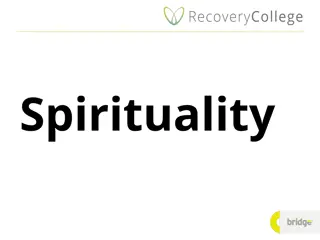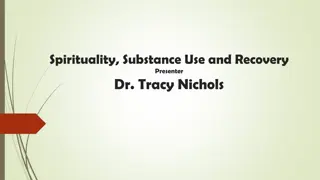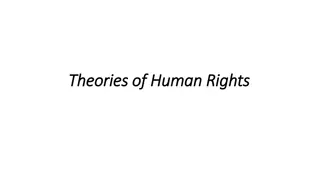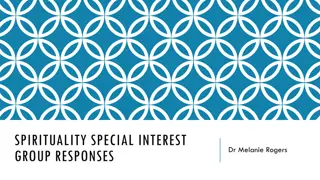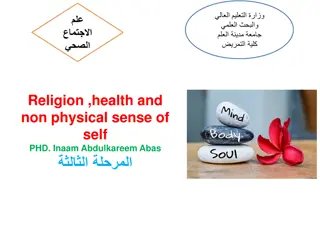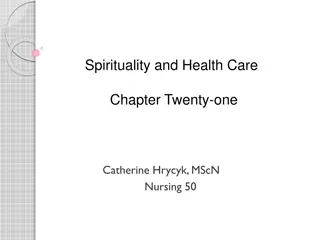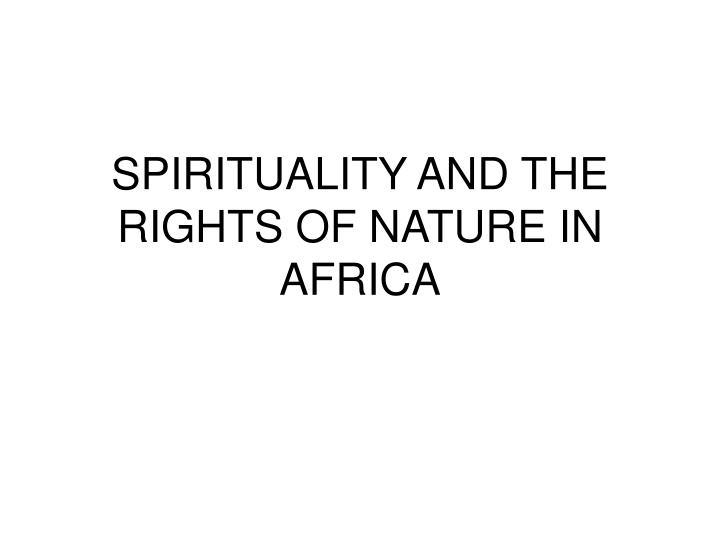
Exploring Spirituality and Nature's Interconnection in Africa
Delve into the realms of spirituality and the rights of nature in Africa, understanding the profound impact of human beliefs and practices on the environment. Discover how spirituality shapes relationships, values, and life purposes, offering hope and communal values, while also exploring the intricate relationship between living beings and the environment.
Uploaded on | 4 Views
Download Presentation

Please find below an Image/Link to download the presentation.
The content on the website is provided AS IS for your information and personal use only. It may not be sold, licensed, or shared on other websites without obtaining consent from the author. If you encounter any issues during the download, it is possible that the publisher has removed the file from their server.
You are allowed to download the files provided on this website for personal or commercial use, subject to the condition that they are used lawfully. All files are the property of their respective owners.
The content on the website is provided AS IS for your information and personal use only. It may not be sold, licensed, or shared on other websites without obtaining consent from the author.
E N D
Presentation Transcript
SPIRITUALITY AND THE RIGHTS OF NATURE IN AFRICA
Introduction: Spirituality refers to the attitudes, beliefs and practices of a person or group of people through which they deal or relate with the supreme (higher) being.
Human spirituality is thought as composing of three aspects: relationships, values, and life purposes
Spirituality can help people develop a more hopeful outlook on life in dealing with life challenges
On the communal level, spirituality may be used to refer to the shared ultimate values and ideals promoted by a particular group or tradition
On the academic level, spirituality refers to the emerging scholarly discipline which studies the lived communal and individual experience of that energy, power, or force.
NATURE refers to the things not created by humans. It can also be called ENVIRONMENT or ECOLOGY .
Your Environment is everything around you minus you. Both the living and non-living
The environment covers the Bio-physical (plants, animals, air, water, soil etc), Socio-economic (governance, economics, culture, religion etc), and Human health (disease prevalence, nutrition, sanitation etc) aspects.
There is a relationship (interaction) between living things to one another and their environment
What is right of nature It is the acknowledgement that nature in all its life forms has the right to exist, persist, maintain and regenerate its vital cycles . (www.elgaworld.org)
African spirituality has developed consisting of traditional African beliefs and practices, Christianity and its influences on the traditional beliefs, Islamic faith and the culture of modernization
African Spirituality and Their Teachings on Nature
Traditional African Spirituality Africans are not a homogeneous people hence their traditional spirituality and worldviews differs. African spirituality involves deeper human values, attitudes, beliefs and practices, based on various African worldviews
These African worldviews are changing with times due to the influence of secularization and modernization.
Although Christianity and Islam have added distinct elements to African religions, each has been and continues to be adapted to and shaped by Africa s indigenous religious heritage.
African traditional spirituality is the indigenous spirituality of Africans that has been communicated down from one generation to another by the forebears of the present generation of Africans
it is a spirituality that originated from the people s environment. It is a culture which is learned and imitated by all belonging to various specific spiritualities
African spirituality and the life of the people are interwoven. In African spirituality natural phenomena and objects are intimately associated with the Divine.
The way in which African spirituality is practiced varies from one community to another, region to region and country to country
Humanity and nature are believed to have originated from God and bear witness to him. Nature is viewed as a visible expression of God.
Humanity is part of nature which includes animals, plants and inanimate objects etc. All these components are related to each other in various ways, and all these are dependent on the Supreme God for their appearance and their continued existence.
Religious beliefs and taboo systems are at the centre of life of Africans. The African spiritual worldviews create respect for nature, reverence for hills, forests, animals, and rivers.
hence among the igbos of Nigeria some people take their names after nature, eg ugwu (mountain), iruro (plant), oji (iroko tree) etc .
In Africa and indeed Nigeria, the traditional religion holds the strength on the ascription of psychic/ supernatural powers to objects in nature.
The major tenet of African traditional religion and belief system lies in the belief that the abode of the gods and goddesses can be within the community rocks, streams, pond, tress, land or anywhere they so desire.
In Africa many who identify as Muslims or Christians are involved in traditional religions to one degree or another
many Africans have converted to Islam and Christianity, and these religions inform the social, economic, and political life in African societies
Christianity and Nature: A key Christian view on the environment are revealed by the following: Genesis 2 vs 15, The LORD God took the man and put him in the Garden of Eden to work it and take care of it .
Other opinions argue that Christians are given a right to dominate nature and its resources citing Genesis 1 vs 28-30
However, James Limburg, argued that Genesis 1:28 does not advocate tyrannical exploitation of nature but rather responsible use and care of it.
Lynn White (1967) in his paper, The Historical Roots of Our Ecologic Crisis championed the view that Christianity has no regard for environmental conservation.
There are divided opinions but environmental conservation is believed by Christians to be inbuilt in Divine instruction on how to handle the earth. Hence from the beginning, God established what the relationship between man and the environment should be
Islam and Nature The Islamic concepts in the Qur n regarding taw d (unity of creation), mizan (balance), and am nah (trust or stewardship) reflect values that have been interpreted in relation to the natural world.
Islamic practices such as hima (protected sanctuaries) and aram (sacred precincts) represent ancient customs that have contemporary environmental implications
Impacts of African Spirituality on Nature
Traditional African Spirituality Impacts on Nature 1. Taboo is a cultural or religious custom that forbids people not to do or touch certain things eg eat certain foods, meat, enter certain places etc.
Africans have a variety of taboos associated with plants, animals, snakes, sacred sites, religious materials and birds. These protects these plants or animals in their natural environment thereby promoting ecological biodiversity
2. Totem is a natural object, an animal or plant regarded as a symbol by a given tribe or family And are regarded with special awe, reverence, and respect.
The totems include those animals, birds, or plants that they do not kill or touch due to their religious significance eg Python is forbidden to be killed in many communities in Nigeria.
3. Sacred Places sacred are those things, situations, and places that are set apart, and emit an aura of the holy and are connected with the supernatural.
It involves the setting aside of forest, streams, ponds by traditional authorities for sustainable resource use and the preservation of vital biodiversity, protect watersheds, fragile ecosystems, as well as plants and animals of conservation importance to the local community
In Nigeria such forests or streams are called forbidden places. Wildlife cannot be killed in such places and also fishing is prohibited in such streams
Traditional authorities are titleholders of such areas, and exercise general administrative functions over them. The management, defense, and preservation of such lands are the responsibility of the entire community
Rules and regulations are enacted to govern the utilization of resources found in these sites. The control of resource use in such areas facilitates maximum ecological biodiversity at the sites.
4. Belief that some African Natural Phenomena Have Mystic Powers Mystic powers are supra-human forces that influence human affairs either positively or negatively. Africans believe that the universe is full of powerful forces that directly connect physical objects, animals, and plants
Africans explain the mystic world as consisting of a hierarchy in relation to control of the natural world. The community classifies mystic beings as gods, divinities, spirits, and ancestors.
Ancestral spirits are regarded as guardians of natural environmental resources. If one destroys what is portended as sacred, ancestors punish him or her with death or misfortunes
Some environmental resources are dreaded because they are believed to be artefacts of evil people or possessed by evil forces; hence, no one destroys them. If one interferes with them, it is believed that he or she will die or be affected negatively by the mystic forces concerned.
5. Influence from Traditional and Religious Specialists African religious specialists are those people who are experts in particular branches of religion such as worship, medicine, divining, prophecy, soothsaying, rainmaking and initiation




